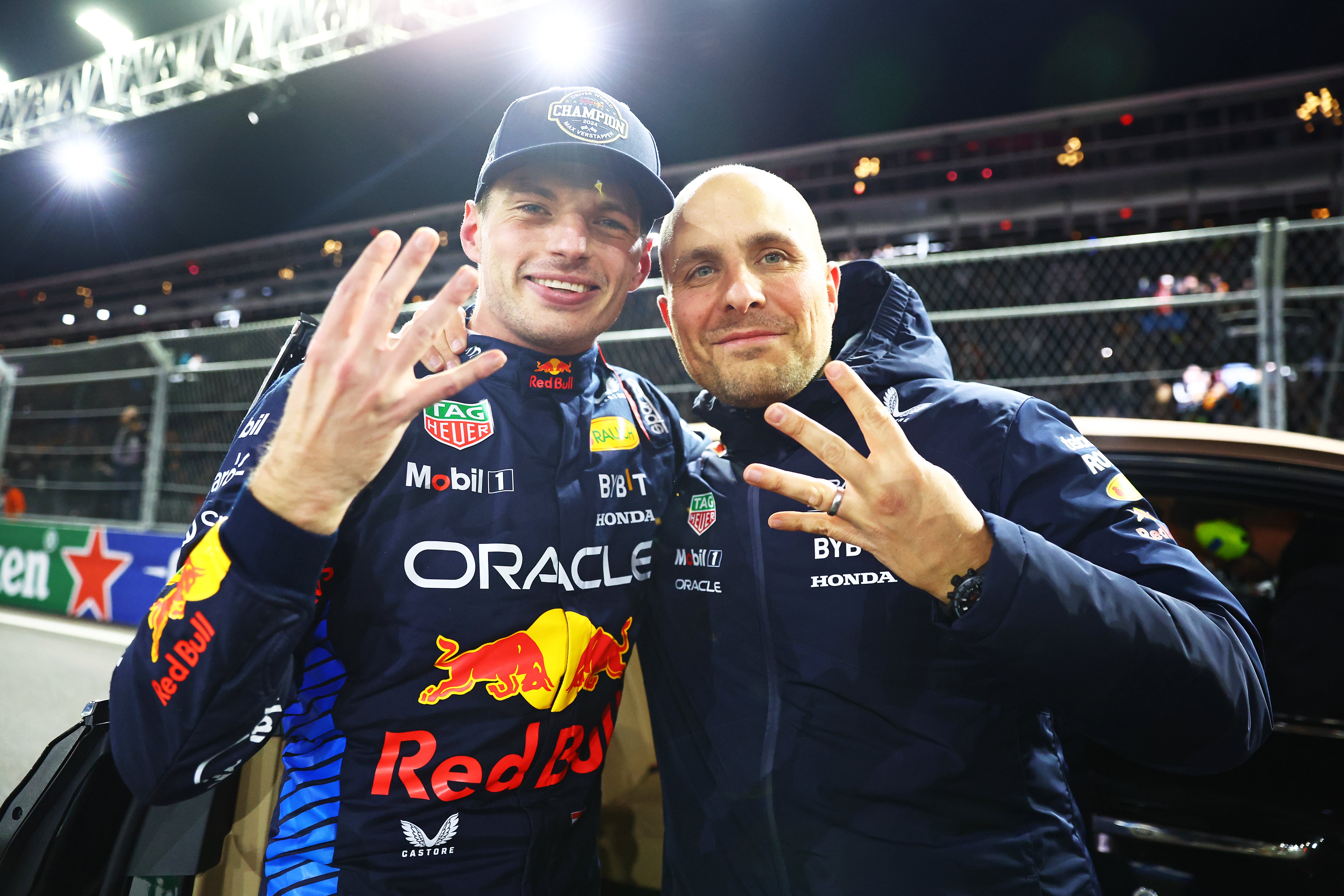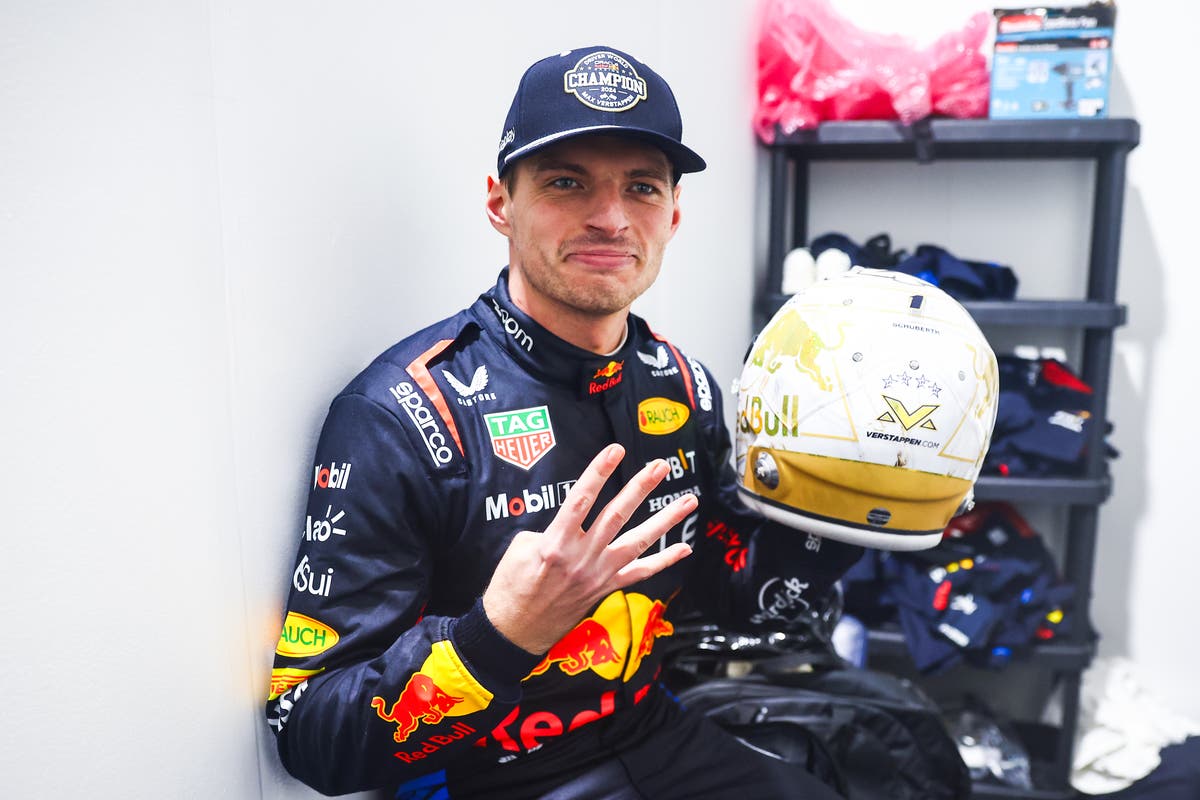It is rare that we learn fresh pieces of detail about drivers on the Formula One grid. Particularly the leading protagonists – the big guns – such is their exclusive status and Superman-esque powers behind the wheel. But as the clock struck midnight in Sin City on Sunday, the man in Max Verstappen’s ear spoke with a distinct clarity of thought when asked about his driver’s brilliant charge to a fourth F1 crown.
What makes the Dutchman, a four-time world champion at 27, unique?
“What you hear on the broadcast is not necessarily Max, it’s just his adrenaline at the time,” said Verstappen’s race engineer Gianpiero Lambiase in a rare television interview after the Las Vegas Grand Prix.

“As much as he’s got bravado, he will absorb every piece of information. That’s his real strength.”
From a previous group of a dozen, in securing his fourth title Verstappen joins a club altogether more exclusive. Only five other drivers have won at least four F1 world championships: Michael Schumacher and Lewis Hamilton (seven), Juan Manuel Fangio (five) and Alain Prost and Sebastian Vettel (four).
Love him or loathe him, F1’s ultimate Marmite figure is now indisputably among the all-time greats.
Yet this year tested the indomitable Verstappen in more ways than one. Off-track, the soap opera maelstrom which engulfed Red Bull at the start of the season saw his dad Jos and boss Christian Horner in a highly-publicised dispute. On-track, Red Bull have not had the quickest car since race six and, for a period, were clearly the fourth-quickest team on the grid.
Yet Verstappen has come through all of it – speculation over his future at Red Bull, squabbles in the cockpit with closest challenger and friend Lando Norris and even the FIA looking to quash his forthright, sometimes foul-mouthed, language – to seal the title with two races left.
It is why he stated, while sipping a can of Heineken in the Vegas paddock, that this was his best title yet. Better, even, than his intoxicating and controversial quarrel with Lewis Hamilton three years ago.
“This year has shared many similarities to 2021,” Lambiase added. “It was getting pretty intense, at times. The buffer we had at the start of the year [after four wins in the first five races] cemented it.
“He has taken another step. I am proud of him.”
After that first title in 2021, Verstappen set new records for consecutive race victories and percentage of wins in the last two years. His team won all but one grand prix in 2023. He claimed the individual prize at a canter.
This year was different. McLaren and Ferrari’s standing above Red Bull in the constructors’ standings – notwithstanding No 2 Sergio Perez’s torrid season – emphasises the different skillset and mentality needed this year.
A large chunk of the European summer swing was characterised by damage limitation. He started 11th in Belgium after an engine penalty and still finished fourth, above Norris. While the Brit spurned the chance to win in Monza, Verstappen finished just three places behind his rival. Even when Norris claimed victories in Zandvoort and Singapore, he only capitalised by eight points – with Verstappen standing next to him on the podium in second.
With a string of competitive teams – and seven different race winners – this year has tested Verstappen’s resolve in the face of adversity. His sharp focus and phenomenal driving attributes meant Norris never actually got within 40 points of him. And meant the best win of his career, in Brazil three weeks ago, was a de facto title-clinching drive.
Looking ahead, what a highly combative 2024 campaign means for next year is fascinating. There is a very genuine prospect that four teams, perhaps five with Adrian Newey joining Aston Martin, could be regularly battling for victories in 2025. When you add Lewis Hamilton joining Ferrari and Mercedes talent Kimi Antonelli (who has been compared to a young Verstappen) into the concoction of wildcard ingredients, it is set up for an exhilarating season.
Five individual F1 titles in a row has only been accomplished once before, with Schumacher’s streak at Ferrari at the start of the century. Of course, Hamilton came agonisingly close in 2021. But matching the legendary German next year would put Verstappen in a class even swankier than the lofty one he currently inhabits. And put him firmly in the debate to be the greatest of all time.
However, records do not motivate him. He has said this on multiple occasions, alongside threats to quit the sport, and his involvement in F1 beyond the end of his current contract in 2028 is somewhat in doubt. On some levels, perhaps that’s unsurprising. Even at the prime age of 27, this year represented his 10th season in a row in the F1 globetrotting circus. He’s already made it clear he does not want to race deep into his thirties.
But you never know what is around the corner: 2025 could be Verstappen’s best opportunity to win another title in the next five years. Sebastian Vettel won four on the spin at Red Bull and no more. New engine and chassis regulations come into force in 2026; a year when Red Bull are producing their own power unit for the first time, alongside American automotive giant Ford. That will provide a fresh challenge in itself.
Mercedes are already full steam ahead for those next set of rules, especially after their butchering of the current set of regulations. Newey will be casting a stern eye on ’26 too at Aston, while Ferrari and McLaren have poached some of the sport’s leading aerodynamic minds.
But what this season proved beyond all doubt is that Verstappen does not need the quickest car to triumph over 24 races – a point he made comically to McLaren boss Zak Brown live on Sky Sports.
If he’s simply in the dogfight, with a sweet-tasting bone of five in a row in his sight, you’d be bold to wager against him next year.

